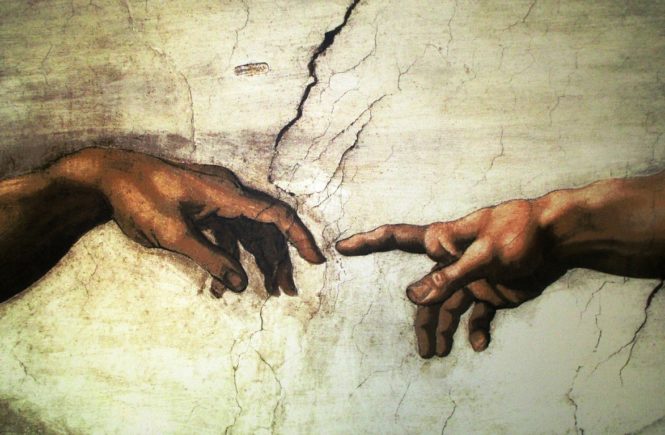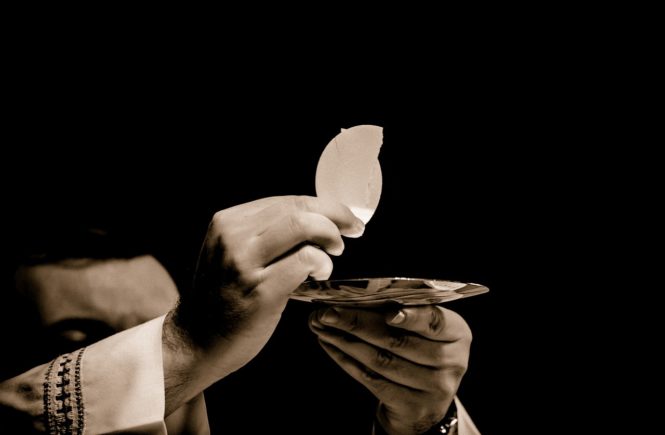The Gospel last week presented us with the challenge to forgive, admonish, and reach out to those who have sinned against us.
Today, the holy liturgy follows the theme on anger and resentment and the importance of forgiving injustice. The first reading
says, “Wrath and anger are hateful things, yet the sinner hugs them tight.” Instead of focusing on the importance of forgiveness and letting go of anger, I would like pivot to what seems to be the root of anger in our times. One of the roots, at least, is politics.
The word of God is meant to comfort the afflicted, but also discomfort the comfortable. I am not sharing my personal view but rather, official Church teaching, and it forms a part of the body of documents of social justice that the Church has been preaching for literally hundreds of years.
“The Church should not be political!”
We have heard this phrase, and there is some truth to that, if political means choosing one party and promoting one party, one candidate over the others. In that sense, the Church has no interest in being political. But if we define being political as examining the policies that parties embrace and the ideologies that drive them, then the Church is deeply political in standing for the gospel of her Founder, especially when it comes to oppression and suppression of human dignity.
So, to the phrase “the Church should not be political”, we can say that
The Church is not interested in politics but is deeply interested in policies
In the coming weeks, we as American Catholic Christians are blessed with the grave moral responsibility to exercise our vote in good conscience. I would like to offer some words of reflection to guide our prayer and discernment.
Sometimes I imagine myself living in early 20th century Germany. Knowing that all the great dictatorships of the last century arrived to power via democracy – they were voted into power – for whom would I have voted? Would I have voted for the smooth-talking dictator? Maybe, living in financially-depressed and decimated Germany after WWI, I would have listened to the commanding man who promised a solid and prosperous future for my family and me.
Would I have continued to vote for him when his party amended its platform and pushed its ideology a little further?
And then a little further…?
And a little further…until it was preaching hatred against one group and making my conscience squirm? At what point would I have decided that the party and its platform reached a position that was no longer tolerable in my conscience?
There is no one candidate or one political party that completely aligns with Church teaching in every sense. Even if there were, the Church would have no interest in officially backing one candidate over another. The Church has interest not in candidates, but in policies. The Church’s job is to ask:
What policies do you promote?
How do you protect human dignity?
I would like to offer some reflections on popular ideologies taking hold in our country, in our times, in our world. Many of you have experienced the rise and fall of communism. Even today, in countries like Cuba, Venezuela, and China, Marxist socialism started with ideals to eradicate poverty, to eliminate any form of social division and social oppression.
Good goals, perhaps.
But the Church condemned Marxist socialism based on how it seeks to implement “freedom”. One of the ways Marxist socialism is achieved is complete uniformity:
Eliminate all those things that divide the people.
Religion divides the people → eliminate religion.
Social class divides people → eliminate social classes.
Private property divides people → eliminate private enterprise and ownership.
Opinions divide people → eliminate freedom of expression.
End result: uniformity via eradication of basic human rights.
There is but one religion: the State.
Little by little, the state becomes “god”, and that “god” demands worship and subservience.
In our own part of the world presently, there is a form of Marxist socialism brewing, but now it is not the State that is being deified.
It is the individual.
And if that god – the individual – sees that a human life developing inside goes against that god’s decisions or plans, that life should be sacrificed for the sake of this individual’s freedom.
The Church cannot stand idly by ideologies that deny a human being the right to life. If a political party amends its platform to expand abortion even to the day of birth, while abolishing any dissenting voices within the party, then the Catholic Christian must own the grave responsibility of re-examining his conscience and his affiliation to that party. Life is sacred, and we cannot allow that human right to be diluted, not for the unborn and not for the sake of a false compassion (euthanasia) for our elderly. The church condemns socialism on these grounds.
Nonetheless, the Church also condemns a very liberal, unbridled capitalism with as much force as it condemns socialism. You might wonder what the Church possibly could condemn about Capitalism? Capitalism’s fruits are prosperity, technological advancements in medicine, communication, infrastructure, agriculture, among so many others. The church condemns liberal capitalism on different grounds than it condemns Marxist socialism, but it does speak against this unbridled capitalism. These are the words of Pope Pius XI, almost 100 years ago:
Capitalism itself is not to be condemned, and surely it is not vicious of its very nature. But it has been vitiated by the international imperialism of money.
It’s not the individual that is god. Rather, the deity is money, financial systems, corporations. The Church condemns unrestrained capitalism on these grounds. These are the words of Pope Saint John Paul II, who fought against the abuses of communism.
The Marxist solution has failed, but the realities of marginalization and exploitation remain in the world, especially in the Third World, as does the reality of human alienation, especially, in the more advanced countries. Against these phenomena, the Church strongly raises her voice. Vast multitudes are still living in conditions of great material and moral poverty. The collapse of the communist system in so many countries certainly removes an obstacle to facing these problems, but it is not enough to bring about their solution. Indeed, there is a risk that a radical capitalistic ideology could spread, which refuses even to consider these problems in the belief that any attempt to solve them is futile, and those problems should be blindly entrusted to the development of market forces.
How true that human alienation is in our country! We could be financially prosperous but spiritually void. There is a moral poverty in our advanced countries that does not seem as wretched in Third World countries. “May the free market buoy these countries! May hard work raise them out of poverty!”-They claim.
We only need to see the mortgage crisis and job losses of 2008 to realize that unbridled capitalism succumbs to the selfishness of human nature.
Since the pandemic started, more than 40 million Americans have lost their jobs. How have richest 1% of Americans been affected? The 1% actually grew 30% richer over the course of six months, while 40 million are unemployed.
What is going on?
It is not capitalism, the Church posits, but a very radical form of capitalism taking root, this god. What is growing from this radical capitalism?
Astronomical national debt, which mortgages the future of our children and forthcoming generations.
Large corporations, modern-day empires, lobbying with governments not for human dignity, but for the sake of bottom lines and profit alone.
Many people are being deported and families are being divided.
Natural resources are being abused and depleted.
The Church cannot stay idle when it sees that the value of the human being is not measured by its dignity but by its productivity. What productivity do our elderly have? Our physically or mentally sick brothers and sisters, the poor, the oppressed?
In light of these driving ideologies, for whom, then, do we vote?
How do we exercise this grave responsibility?
I invite you, first, to study the platforms and policies.
Recognize that some rights are more fundamental than others, from which the rest stem.
I cannot compare the right to flee from an oppressive government -the right to migrate- with the right to be born.
I cannot compare the right or the freedom of work with the freedom of religion.
Let me reiterate that:
There are some rights more fundamental than others
In these upcoming weeks, as you and I prepare to exercise our vote, it will be a struggle if we do it right. It always is a struggle because there is no candidate or political party that aligns completely with Christian teaching, and even there were, the Church has no interest in officially endorsing them. As Christians, we approach this discernment process with the Gospel of Christ in one hand and the newspaper in the other.
Voting in conscience is not sufficient.
We vote consistent with an informed conscience.
We research and vote accordingly. Our votes are placed properly in the context of prayer and of love:
~patriotic love of our country,
~love we have for the Gospel of Christ,
~the love we have for human dignity.
May Mary, the Seat of Wisdom, guide our discernment and our reflection in these upcoming weeks, as we prayerfully discern our vote.




